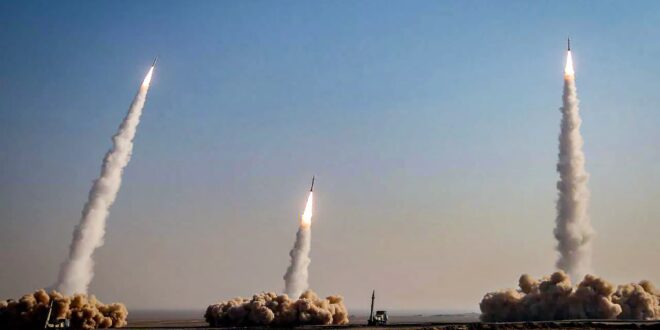The IRGC bombarded bases belonging to the Jaish ul-Adl terrorist militia group in a remote area of Pakistan on Tuesday, with the strikes coming less than 24 hours after separate Iranian attacks on jihadist and Mossad targets in Syria and Iraq. Sputnik asked veteran political analyst Mohammad Marandi about the Pakistan strikes’ implications.
Iranian media has released details about Tuesday’s dramatic Islamic Revolutionary Guard Corps (IRGC) missile and drone attacks against two major bases belonging to the Jaish ul-Adl (lit. “Army of Justice”) terrorist group in Baluchistan, western Pakistan, revealing that the strikes targeted the Koh-e-Sabz area of the province, the militants’ home base.
“We see no limitations in defending our national interests and people, and will certainly do this authoritatively,” Iranian Defense Minister Mohammad Reza Ashtiani said Wednesday in the wake of this week’s series of extra-territorial missile strikes. “No matter where threats against the Islamic Republic come from, we will react and the response will surely be proportionate, decisive and strong.”
Pakistan recalled its ambassador to Iran on Wednesday and barred Tehran’s envoy from returning to Islamabad, with the Pakistani Foreign Ministry condemning the “illegal and unacceptable” Iranian strikes and reserving the right to respond. Just hours before the attacks, warships from the two countries held a naval drill in the Strait of Hormuz and the Persian Gulf near the port city of Bandar Abbas.
‘Strong Messages’
“The Iranians are sending strong messages both to the Israeli and US regimes as well as their proxies” through their campaign of long-range missile and drone strikes, political analyst and Tehran University Professor Mohammad Marandi told Sputnik. “The so-called Jaish ul-Adl terror group has massacred many innocent Iranians. Since Pakistan’s government has limited control over areas near the Iranian border, Iran felt that it had no option but to strike at this group,” Marandi explained.
While Pakistan has condemned the strikes, there is “more understanding between the Iranian government and the Pakistani government than meets the eye,” with the two countries traditionally enjoying “very good” ties and remaining in constant dialogue, according to Marandi.
“Of course, the Pakistani government needs to protest, but behind closed doors, both sides are cooperating, and both sides are very concerned about terrorism. The same is true with Iraq. The central government in Iraq has to protest against Iran for obvious reasons. But they know quite well that they do not have the sort of control over northern Iraq that they should have. They understand that American and Israeli influence there is detrimental to their interests and to the interests of the Iraqi people. So, behind closed doors, the relationship is very different. Iran and Pakistan as well as Iran and Iraq, will continue to preserve strong relations,” the scholar stressed.
Ultimately, Marandi believes Iran’s hand was forced in Pakistan by the recent escalation of terror attacks inside Iran, including in Rask and Kerman, which the observer characterized as an attempt to “pressure” the Islamic Republic over its support for the Palestinians in Gaza amid the Israeli military’s assault.
“The United States and Israel are using terror organizations to strike at Iran and the Resistance Front,” Marandi said, referring to the loose anti-US and anti-Israeli coalition of countries and groups including Iran, Syria, Lebanon’s Hezbollah and Palestine’s Hamas militias.
“They’re using northern Iraq, Syria, as well as the no man’s land in Pakistan near the Iranian border to carry out these operations. We know that these terror organizations have a long-lasting relationship with Western intelligence agencies and the Mossad. So, as genocide is taking place in Gaza, US and Israeli terror groups have escalated attacks against Iran and the Resistance. For example, we saw the terror attacks in South-Eastern Iran. The Iranian strikes were retaliation for the terror attacks but also preemptive measures to prevent future attacks,” Marandi summed up.
Who are Jaish ul-Adl?
Hiding outside Iran to avoid a crackdown by the Islamic Republic’s military and security services, Jaish ul-Adl is a Sunni Salafist separatist group with links to al-Qaeda* which has waged a decade-plus long campaign of low-intensity guerrilla warfare and terrorist attacks against the Iranian government since its founding in 2012. Over the past 12 years, the militants have targeted IRGC troops, border guards, police, and dozens of civilians in armed attacks, kidnappings and suicide bombings – with their latest attack occurring in mid-December, when Jaish ul-Adl attacked a police station in Rask in southeastern Iran’s Sistan and Baluchestan province, killing 11 police officers in an ambush. The group has also been accused of drug smuggling, with Sistan and Baluchestan long serving as a crossroads of the international drug trade from Afghanistan to Europe before the Taliban** crackdown on opium poppy cultivation following the collapse of the US puppet government in the country in 2021.
 Eurasia Press & News
Eurasia Press & News




